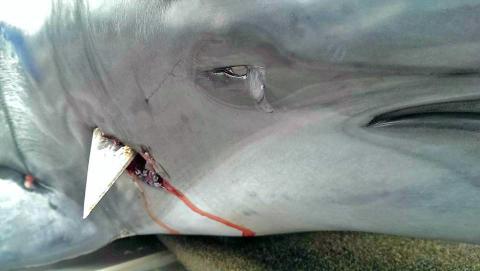The discovery on Thursday of a protected marine species off the coast of Hualien that had been harpooned shows that illegal harpooning is still rampant in Taiwan and action must be taken to preserve the protected species, the Kuroshio Ocean Education Foundation said yesterday.
Foundation chief executive Chang Hui-chun (張卉君) said that a whale-watching boat carrying clients and two of the foundation’s guides discovered a spinner dolphin drifting in the ocean with two harpoons sticking out of it at about 10am on Thursday.
Despite efforts to lift the dolphin onto the boat so that it could be taken to the Hualien Fishing Port for emergency medical treatment, it died from its injuries about 10 minutes after it was spotted, Chang said.

Photo courtesy of the Kuroshio Ocean Education Foundation
The spinner dolphin was “at least three years old” and a male, the guides said.
Upon the boat’s return to port, the carcass of the dolphin was handed over to the Coast Guard Administration’s Hualien Fishing Port security office, which forwarded the body, harpoons and bits of leading cable that were still attached to the harpoons to the Hualien Farglory Ocean Park for temporary storage, Chang said.
The office’s deputy director, Lai Ming-chi (賴銘琦), said it would conduct an investigation into which fishing boats in Hualien County are registered to carry harpoon guns in an attempt to find the owner of the harpoons.
Kuroshio Ocean Education Foundation office manager Lai Wei-jen (賴威任) said that the harpoons found in the dolphin are commonly used to harpoon swordfish.
Swordfish are not in season and the motives of any fishermen going out to sea with harpoons should be investigated, Lai said, adding that the fishermen might have cut the dolphin loose after realizing they had harpooned the wrong fish.
According to the Council of Agriculture, any person who attempts to hunt or kill a spinner dolphin, which is ranked as a second-class species on the council’s rare animals list, has violated the Wildlife Conservation Act (野生動物保育法) and could be sentenced to between six months and five years in prison, or fined between NT$200,000 and NT$1 million (US$6,206 and US$31,032).

The Ministry of Economic Affairs has fined Taobao NT$1.2 million (US$36,912) for advertisements that exceed its approved business scope, requiring the Chinese e-commerce platform to make corrections in the first half of this year or its license may be revoked. Lawmakers have called for stricter enforcement of Chinese e-commerce platforms and measures to prevent China from laundering its goods through Taiwan in response to US President Donald Trump’s heavy tariffs on China. The Legislative Yuan’s Finance Committee met today to discuss policies to prevent China from dumping goods in Taiwan, inviting government agencies to report. Democratic Progressive Party Legislator Kuo Kuo-wen (郭國文) said

The Ministry of Economic Affairs has fined Taobao NT$1.2 million (US$36,900) for advertisements that exceeded its approved business scope and ordered the Chinese e-commerce platform to make corrections in the first half of this year or its license would be revoked. Lawmakers have called for stricter supervision of Chinese e-commerce platforms and more stringent measures to prevent China from laundering its goods through Taiwan as US President Donald Trump’s administration cracks down on origin laundering. The legislature’s Finance Committee yesterday met to discuss policies to prevent China from dumping goods in Taiwan, inviting government agencies to report on the matter. Democratic Progressive Party

Taiwan and its Pacific ally Tuvalu on Tuesday signed two accords aimed at facilitating bilateral cooperation on labor affairs, according to Taiwan’s Ministry of Foreign Affairs (MOFA). The governments inked two agreements in Taipei, witnessed by Foreign Minister Lin Chia-lung (林佳龍) and visiting Deputy Tuvaluan Prime Minister Panapasi Nelesone, MOFA said in a news release. According to MOFA, the agreements will facilitate cooperation on labor issues and allow the two sides to mutually recognize seafarers’ certificates and related training. Taiwan would also continue to collaborate with Tuvalu across various fields to promote economic prosperity as well as the well-being of their

Sung Chien-liang (宋建樑), who led efforts to recall Democratic Progressive Party (DPP) Legislator Lee Kun-cheng (李坤城), was released on bail of NT$80,000 today amid outcry over his decision to wear a Nazi armband to questioning the night before. Sung arrived at the New Taipei District Prosecutors’ Office for questioning in a recall petition forgery case last night wearing a red armband bearing a swastika, carrying a copy of Adolf Hitler’s Mein Kampf and giving a Nazi salute. Sung left the building at 1:15am without the armband and covering the book with his coat. Lee said today that this is a serious